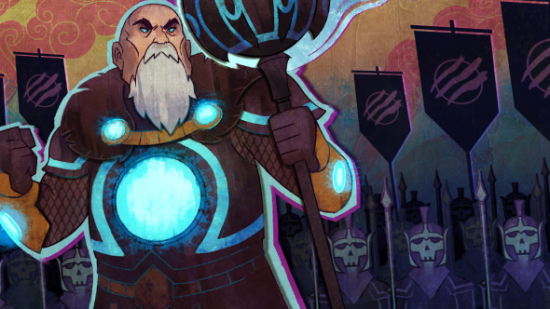A blank page is intimidating. Ask any writer and they will say the same. But, back in the day, that was one of the first things an RPG would present you with. During character creation, Baldur’s Gate and Neverwinter Nights – with one eye on their D&D roots – would throw you a ‘biography’ screen to fill with pertinent details about your new personality. ‘Go on,’ it seemed to say. ‘If you’re going to roleplay, then you might as well do it properly’.
Related: the best ever RPGs on PC.
I remember making a couple of half-hearted teenage attempts – something something rogue, something something tragic past – before becoming accustomed to leaving BioWare’s generic blurb untouched. I know I am not alone in this: our very own Phil has roleplayed every RPG he has ever played as a Caucasian man with brown hair. Named Philip.
Which is to say, a lot of us have never really roleplayed very much in roleplaying games – to the point that the name of the genre has become a slightly silly misnomer. Where on the tabletop you are required to come up with all your own dialogue, CRPGs provide you with framework enough to coast through 100 hours without ever really deciding on who you are.
You might play with the vague idea of making choices according to your own moral compass, and see how well the philosophy of Philip functions in Thedas. Or perhaps you will not play as a character at all, but as a build – a container for a bunch of stats, skills, and weapon proficiencies. If you had asked me who my Neverwinter Nights protagonist was, I would only have been able to tell you that he was the kind of man who dual-wielded magical longswords because the particle effects looked nice.
It might be that, by brandishing that biography, RPG designers are asking for something unreasonable. Real-life personalities are formed by context, after all – the people and situations they come into contact with. But, at any given character creation screen, the family, culture, and personal trauma that might have shaped our protagonist are mysteries yet to be uncovered.
Unless you are willing to build an entire identity around an extreme haircut – as generations of rock music frontmen have before you, granted – then attempting to define a personality before the story even begins is a mug’s game. Even aesthetic choices are potential minefields. Case in point: my first Dragon Age character, a dwarven noble with a face tattoo. Only a couple of hours in did I learn that tattoos were a mark of the casteless in dwarven society, and I had inadvertently trampled all over Thedas’ lore.
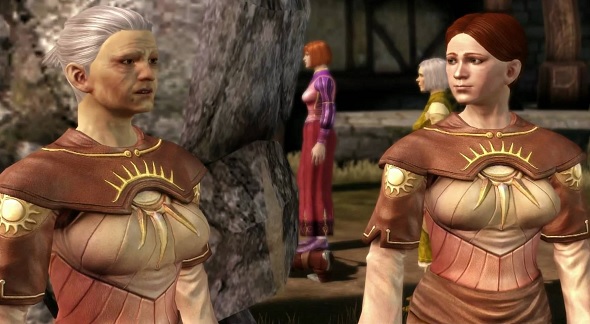
Yet, over the past couple of years, I have found myself filling in the blanks of my characters. I cannot tell you the exact moment roleplaying started to click for me, but I do remember interviewing Chris Avellone shortly before he exited Obsidian, and being surprised to find him a firm exponent of traditional character creation.
“My belief is that you should not guide players down a role that’s like, ‘I see your destination, here’s where you’re going’,” Avellone said. “I think players should have the freedom to create their own destiny because at the end of the day, their story is the one that’s the most important – despite what you intended. What you should be giving them is a playground for them to roleplay their opportunities.”
At the time it felt like an unpopular, even archaic, opinion in the face of the increasingly popularity of Geralt and Shepard. But, playing Obsidian’s Tyranny months later, I found myself roleplaying as Avellone intended.
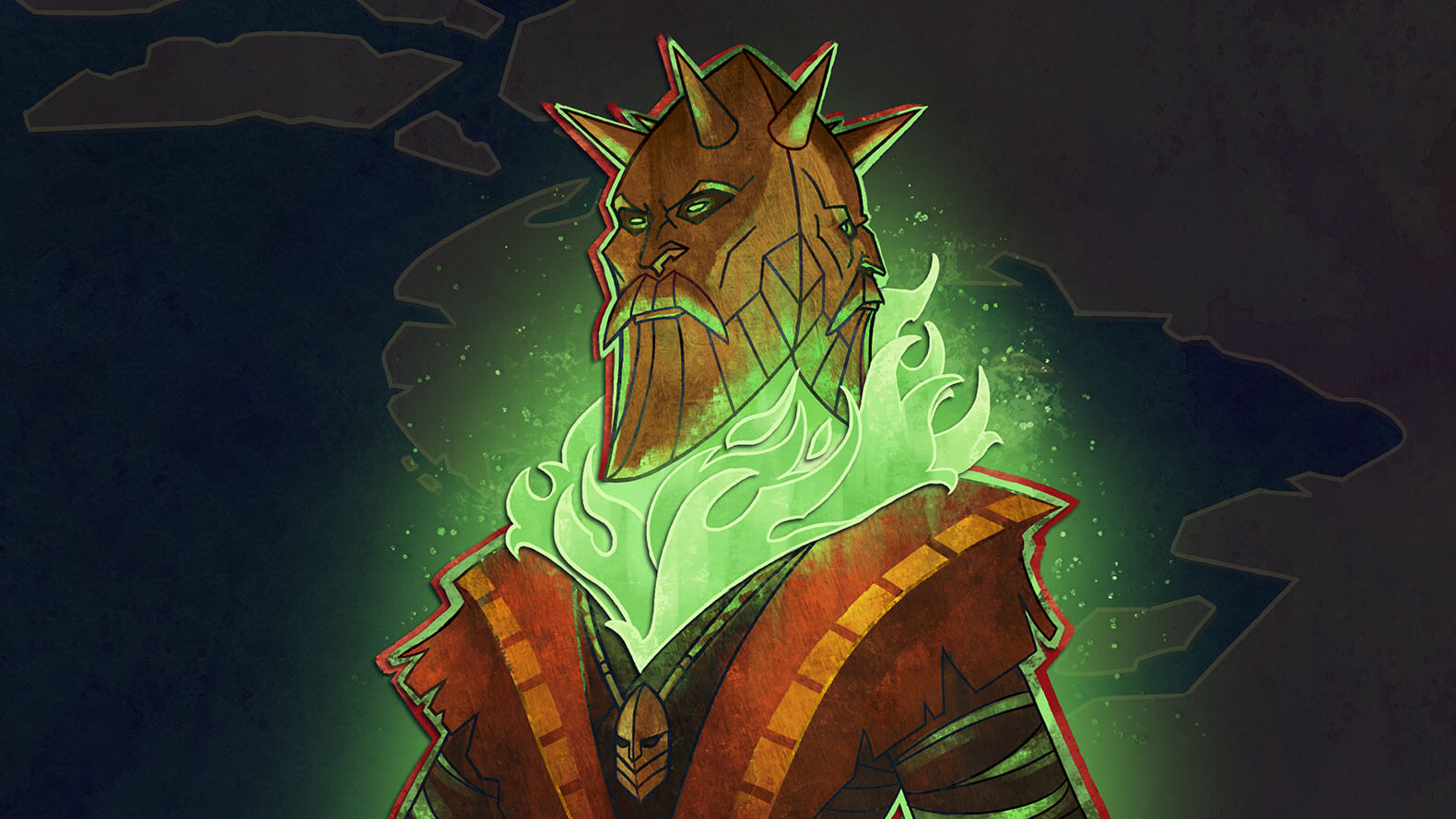
Tyranny felt less like a playground than a workplace – one I had been dropped into ill-prepared. The game casts you as an arbiter of the law, deciding the outcome of life-or-death disputes on the frontline of a war where all of your actions are observed. When your colleagues are gleeful killers like the Scarlet Chorus, whose modus operandi involves violently capitalising on any sign of weakness within their own leadership, the prospect of being watched becomes terrifying.
In that context, my Fatebinder became closeted – a man who did terrible things in the name of the status quo but kept his true self to, well, himself. From there, over tens of hours, other pieces fell into place: an overriding utilitarian belief in order, an unwillingness to connect with companions, even a sexuality. It turned out, if I was patient enough to let Tyranny’s world and events guide the character, a full-fledged personality would follow.
It happened again in Torment: Tides of Numenera. This is a setting also known as the Ninth World – a medieval society built atop the science fiction debris of eight far more advanced civilisations, where even the sand between your toes burbles with sentient technology. Moreover, Torment is a game where death carries none of its negative connotations: at worst, you might just miss the opportunity to knock an enemy to pieces; more often, you learn something from the experience of having your head caved in.
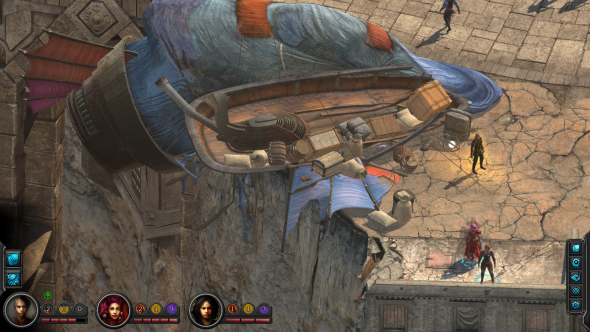
What is left, in a world like that, where there is no cause for fear? Only curiosity. My Torment character became an extrovert who tried everything once – including being cannibalised by a cult capable of ingesting memories. With no reason not to embrace the world with open arms, my character’s secondary drive besides nosiness became empathy. Sure enough, two corresponding tides rose to the top in Torment’s nebulous morality system: blue and gold. If this was a version of myself, it was a highly idealised one I would never dare to live.
It might be that the strange vibes of these two peculiar RPGs prompted my baptism in roleplaying. But that desire to fill in the bios of my characters has followed me into every subsequent RPG since. In fact, I think Divinity: Original Sin II might be the friendliest place for it. While Larian’s game allows you to create an avatar completely from scratch, its masterstroke is in letting you play as one of its companion characters instead.
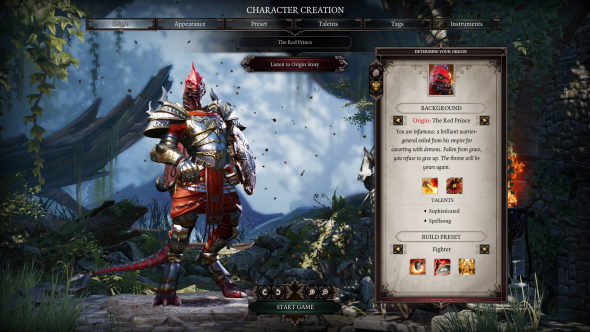
Sebille, the former slave on a hair trigger; Fane, the lich left behind by his own civilisation; Lohse, the affable performer playing host to a demon. Their colourful backgrounds and unique dialogue options provide regular prompts to be someone other than yourself. And they are all, without exception, open enough that there is room for development too – each character merely scaffolding on which to hang your own ideas. My Red Prince, a deposed and power-hungry lizardman, started as a haughty and dismissive toff. But over time, the layers have peeled back to reveal a royal whose steadfast belief in manifest destiny has been shattered by new and undignified circumstances.
There is nothing wrong with travelling across Thedas as Philip, or saving the world as yourself. Just know this: roleplaying might not be so out of reach and high-effort as you think when you’re next faced with a blank bio.
